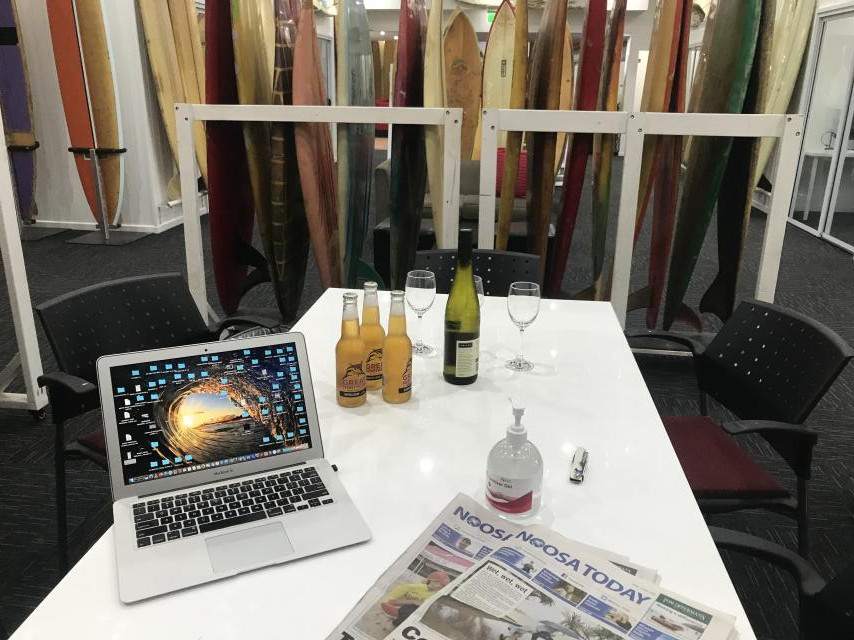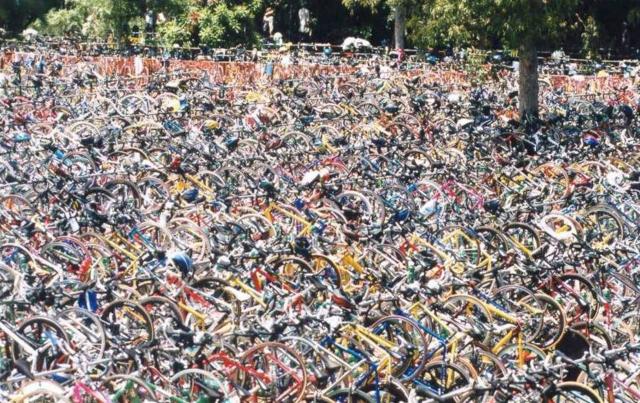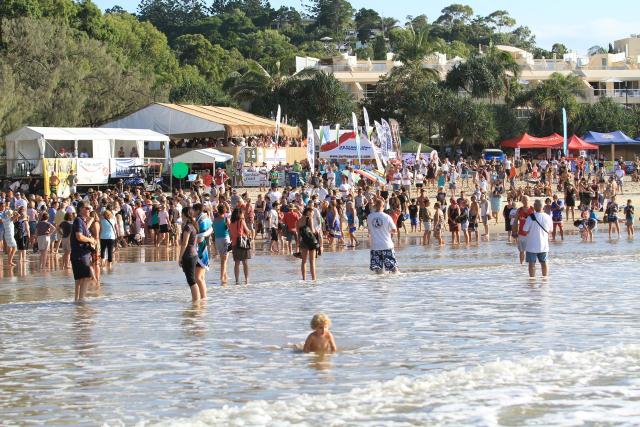Precede
In the wake of the usual complaints about road closures during another successful Noosa Triathlon, PHIL JARRATT asks the anonymous Friday swillers, is it time for an events reset?
Ringleader: Should we be revisiting the whole idea behind our events strategy?
Splinters: I think that’s being done. The strategy was designed to even out the bumps in the tourism economic calendar, but since Covid we’ve been busy every weekend all the time, and often all week all the time. We’ve been discovered by the SEQ drive market. It’s going to increase as the region grows, with Aura reaching the size of Gladstone, so in terms of attracting the numbers, it’s mission accomplished. But I don’t think that means we should discard events totally. Every culture and civilisation has had events to celebrate the things that they’re grateful for, so I think what we need to do is review and refine the purpose of events. Would we want to give up the Noosa Festival of Surfing, for example, when it’s a celebration of something that is so much a part of local culture? Or an event that celebrates local food and produce? Or that brings art, music and dance to town that we don’t normally see here? It’s about what’s important to the tribe.
Ringleader: So you want to review the strategy but find reasons to keep all the events? Maybe then we should be focused on the double-ups. For example, we have a world class triathlon so why do we need an ultra-sports event consisting of the same sports? Could we look at eliminating duplication and possibly cut back time slots and the constant use of the same busy tourist hubs? The Main Beach Events policy from 2018, for example, was quite dogmatic about the fact that events that don’t need to use Main Beach shouldn’t be on it.
Splinters: Noosa Alive was encouraged to go the Woods for that reason. For an event that doesn’t take place in the water or on the sand, then a marquee somewhere else can work. If congestion is the main issue, they should do more in the hinterland.
Ringleader: I don’t think it’s just congestion, it’s also duplication. The surf festival had to fight hard to be allowed to have a beach bar, but once it was done, everyone had one, so it came close to losing its once-a-year appeal.
Bald bloke: My head keeps going back to identity, a Noosa identity as opposed to the broader idea of South East Queensland or the Sunshine Coast. I was recently talking to someone who competes in triathlons in Noosa, Mooloolaba and Port Macquarie every year because each of them has an identity of its own, created by its location and its people. I’m not sure Noosa Alive! has that going for it, although Noosa Eat and Drink probably could if it promoted our own products more. But I think that when we have an event in town almost every other week it starts to water down that identity, the brand of Noosa. How do we nurture these events and avoid losing our identity? I don’t think you can afford to do anything to reduce the keynote events like the Noosa Triathlon and the surf festival. There are also issues with the smaller events, like Pomona’s King of the Mountain. Should we be climbing a sacred mountain in Kabi Kabi country? Maybe we could run around it instead?
Female voice: It’s a bit like saying Nup to The Cup. That campaign works, it’s entered the consciousness, and reducing the footprint of events could too. I don’t think sporting groups should be allowed to just ride roughshod over the rest of the town. Events like the triathlon are too big and they happen too often, in my opinion. Events normally have a life and at the end of it the organisers just eat themselves. But in the meantime, if you just let them, they’ll grow and grow until it becomes all about growth, more sponsorship, more prize money and so on. At Mt Manganui in New Zealand, for example, the town is completely divided down the middle by people who love or hate triathlons.
Ringleader: Neighbouring Tauranga does have a great writers’ festival.
FV: But you wouldn’t know it because there’s always a triathlon on.
Ringleader: There are cities, like Orlando and New Orleans in the US for example, that have become a nonstop event. It makes them great tourism hubs, but more and more residents have to move out. I don’t think we want that in Noosa.
Splinters: I don’t think we’ve reached that point and I don’t think we will if we host events for reasons other than to attract numbers.
BB: Like identity.
Splinters: And to celebrate things you’re grateful for.
FV: How does that work in the context of the triathlon?
Splinters: We’re grateful for health and wellbeing and the triathlon promotes that for all age groups. People come from all over the world to live and train in Noosa year-round and I think that’s a good event outcome. The question about the event itself is, does it have to be that large? I don’t think it does.
Hirsute bloke: Parts of me would like to see all or most of the events just disappear, but other parts of me want them to stay. I think we have something like $1.2 billion in tourism revenue now and I’m not sure anyone wants us to lose that income. You don’t get rid of Tourism Noosa because they’re too good at their job, and you don’t get rid of events because they’re too good. That’s why I’d like to keep them but see them limited in some way, like maybe have the really big events every second year. I also agree that our events should reflect the Noosa identity, focusing on Biosphere principles, environment, local food, fitting these things into the criteria for an event. Ideally, people who come here for an event should leave town with a higher understanding of what it’s all about, and thinking, that place was incredible, can’t wait to go back.
FV: But Noosa’s identity can mean different things to different people. It might mean surfing to me, but triathlon to someone else.
Ringleader: One aspect of identity we haven’t discussed yet is First Nations. Are we doing enough in that space? I think Floating Land was a brilliant concept but it seems to fly under the radar a bit.
FV: It’s been held in different places in different years, but I love that it can be held all over the shire.
Splinters: I think in its first year there were installations in Noosa Woods and last year they had installations along the Park Road Boardwalk and they were incredible. And, of course, Indigenous events celebrating culture, like the Bunya Festival, have been around for hundreds of years.
Ringleader: We talked earlier about events having a lifespan, and often that’s the lifespan of the organiser.
FV: That’s true and sometimes they evolve into something else under new management, which is more or less what happened to the triathlon and the surf festival.
HB: I want to pick up on that. The festival of surfing was more culturally involved when it first started, respecting elders and traditions and embracing all aspects of surfing. Because of that so many relationships were built internationally through it, and it became a melting pot of ideas as well.
BB: The cultural melting pot is great as long as the triathlon doesn’t become a melting pot of lycra-clad uber-rich!
HB: Perhaps Noosa’s greatest export is the international family built out of festivals like our festival of surfing. If you travel to other parts of the world where they surf, you’ll discover that they know and love Noosa because of it. Perhaps the triathlon exports the same sort of ties and goodwill.
Splinters: Yes, it definitely does. It has great global reach. But going back to identity, I often wonder if Noosa and Byron Bay weren’t born as tourist destinations out of a similar spirit, of which fishing and then surfing was a big part, and are now both in danger of losing that spirit.
FV: I think if you let very big companies get out of control with their festivals that is exactly what will happen.
Ringleader: So are you suggesting that we need to enforce more restrictions on the events in order to keep the residents happy about the spirit of place which drew them here?
FV: Well, the footprint is so large now that something needs to be done. They seem to pack up pretty quickly, but the build and the load-in adds at least another week to the duration of the event. It’s a long time.
Splinters: Maybe we need to hear more from local people about what they want from events, because it seems likely that the people we’re hearing complain about what’s happening are the ones who aren’t participating in them, either as competitors or volunteers. But a lot of locals participate in the triathlon, a lot go to the food and wine festival, Noosa Alive and so on.
BB: If you look at our demographic, with the average age being 55 and getting older, many of them are well-heeled and patronise things like food and wine and Noosa Alive. The focus has shifted more to them and away from things like rugby league carnivals, Nippers and the like. If we’re going to keep the identity of the town we have to keep a balance between these things.
Splinters: I saw an interesting statistic the other day – 10,500 people in Noosa are aged 17 or under. That means nearly 20 per cent of us are children. And since Covid the younger adult demographic has really jumped too. So consideration of that should be factored into our events strategy.
Ringleader: Going back to the idea of community consultation on the future of events, I reckon if you went to local people and laid out the 2023 program of major events, and how long each would impact the town from site-build to site-removal, they’d be shocked and would be demanding that we cut it back.
Splinters: I think most of the complaints are about access, being able to get in and out of their street and go about their normal business. And I think we also have to ask, are they serial complainers? The expression, happiness writes a blank page, occurs to me. When people are enjoying life, you don’t hear from them.
FV: People do hate a closed road, even if they’re not going anywhere. Maybe we should have a festival for whingers?











